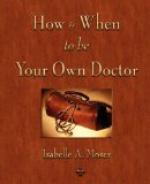The leftovers, elements of the food that can’t be solubilized plus some remaining liquids, are passed into the large intestine. There, water and the vital mineral salts dissolved in that water, are extracted and absorbed into the blood stream through thin permeable membranes. Mucous is also secreted in the large intestine to facilitate passage of the dryish remains. This is an effort. (Intestinal mucous can become a route of secondary elimination, especially during fasting. While fasting, it is essential to take steps to expel toxic mucous in the colon before the poisons are re adsorbed.) The final residue, now called fecal matter, is squeezed along the length of the large intestines and passes out the rectum.
If all the digestive processes have been efficient there now are an abundance of soluble nutrients for the blood stream to distribute to hungry cells throughout the body. It is important to understand the process at least on the level of oversimplification just presented in order to begin to understand better how health is lost or regained through eating, digestion, and elimination. And most importantly, through not eating.
How Fasting Heals
Its an old hygienic maxim that the doctor does not heal, the medicines do not heal, only the body heals itself. If the body can’t heal then nothing can heal it. The body always knows best what it needs and what to do.
But healing means repairing damaged organs and tissues and this takes energy, while a sick body is already enervated, weakened and not coping with its current stressors. If the sick person could but somehow increase the body’s energy resources sufficiently, then a slowly healing body could heal faster while a worsening one, or one that was failing or one that was not getting better might heal.
Fasting does just that. To whatever degree food intake is reduced the body’s digestive workload is proportionately reduced and it will naturally, and far more intelligently than any physician could order, redirect energy to wherever it decides that energy is most needed. A fasting body begins accessing nutritional reserves (vitamins and minerals) previously stored in the tissues and starts converting body fat into sugar for energy fuel. During a time of water fasting, sustaining the body’s entire energy and nutritional needs from reserves and fat does require a small effort, but far less effort than eating. I would guess a fasting body used about five percent of its normal daily energy budget on nutritional concerns rather than the 33 percent it needs to process new food. Thus, water fasting puts something like 28 percent more energy at the body’s disposal. This is true even though the water faster may feel weak, energyless.




